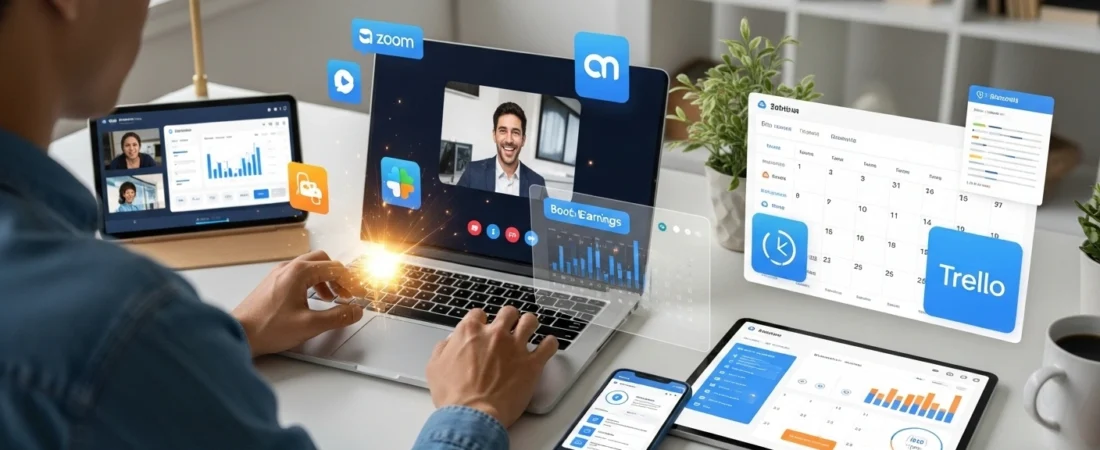The landscape of work has changed dramatically, with remote setups becoming a common reality for many professionals across the United States. While working from home offers flexibility, it also brings unique challenges to maintaining focus and efficiency. The right tools, however, can make a significant difference, helping individuals not only stay productive but also enhance their earning potential by delivering high-quality work consistently.
This article explores essential remote work tools designed to streamline your daily tasks, improve collaboration, and ensure you remain at the top of your game. Employing these resources can translate directly into better performance and, ultimately, increased income.
Core Categories of Remote Work Tools
To manage a successful remote work life, you need a collection of tools that cover various aspects of your professional day.
1. Communication and Collaboration Tools: Effective communication forms the backbone of any productive team, especially when members are not in the same physical space.
- Video Conferencing Platforms (e.g., Zoom, Google Meet): These tools allow for face-to-face interactions, which are crucial for team meetings, client calls, and building rapport. They often include features like screen sharing, virtual whiteboards, and recording capabilities, making discussions more interactive and productive. Imagine a sales professional closing a deal with a client hundreds of miles away, all thanks to a clear, reliable video call. This direct interaction helps build trust and accelerates decision-making.
- Team Messaging Applications (e.g., Slack, Microsoft Teams): Instant messaging reduces the need for constant emails, allowing for quick questions, updates, and informal discussions. These platforms often organize conversations into channels, keeping discussions focused on specific projects or topics. A marketing team, for instance, can quickly share ideas for a new campaign without interrupting each other’s flow.
2. Project Management and Organization Tools: Keeping track of tasks, deadlines, and project progress is vital for staying on schedule and delivering results.
- Task Management Software (e.g., Asana, Trello, Monday.com): These platforms help individuals and teams organize their workload visually. You can create tasks, set deadlines, assign responsibilities, and track progress. Some tools even offer Kanban boards, where tasks move across columns like “To Do,” “In Progress,” and “Done.” This clear overview helps you prioritize and ensures nothing falls through the cracks. A freelance graphic designer, for example, can manage multiple client projects effortlessly, knowing exactly which stage each design is in.
- Cloud Storage and Document Collaboration (e.g., Google Drive, Dropbox, OneDrive): Storing files in the cloud ensures everyone has access to the latest versions of documents, spreadsheets, and presentations. Collaborative features allow multiple people to work on the same document simultaneously, seeing changes in real-time. This eliminates the confusion of multiple document versions and speeds up review processes.
3. Focus and Productivity Enhancers: Working remotely can sometimes bring distractions. Tools designed to improve focus and manage time help maintain high productivity levels.
- Time Tracking Software (e.g., Toggl Track, Clockify): For freelancers or those paid by the hour, accurate time tracking is essential for billing. For everyone, it provides insights into how you spend your work hours, helping you identify time sinks and optimize your schedule. Knowing exactly how long a specific task takes allows you to quote projects more accurately or allocate your time more wisely.
- Noise-Canceling Apps/Hardware: While not strictly software, good headphones with noise-canceling features, or even ambient noise apps (like White Noise Lite), can create a more focused environment, blocking out household distractions. This helps you concentrate deeply on complex tasks.
Leveraging Tools for Greater Earning Potential
Simply having these tools is not enough; using them effectively can directly impact your ability to earn more.
- Efficiency Means More Capacity: When you work more efficiently, you complete tasks faster. This means you can take on more projects, potentially increasing your income, especially if you are a freelancer or paid per project.
- Professionalism Attracts Better Clients: Using organized project management tools and maintaining clear communication shows clients you are professional and reliable. This can attract higher-paying clients who value seamless collaboration and timely delivery.
- Better Results Lead to Referrals: When these tools help you deliver exceptional work consistently, clients are more likely to recommend you to others. Word-of-mouth referrals are often the best source of new, high-value opportunities.
In conclusion, the right remote work tools are an investment in your productivity and professional growth. They empower you to overcome the unique challenges of working outside a traditional office setting. By thoughtfully choosing and skillfully using these resources, you enhance your output, improve your professional image, and ultimately pave the way for increased earnings in your remote career.
